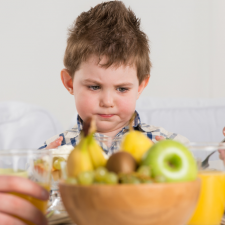When your child is a picky eater
Meals are important social times in a child’s day. They help children learn about food while connecting with family and friends.
Eating in a positive atmosphere helps children develop healthy attitudes about food and themselves. Parents and caregivers play an important role in keeping mealtimes relaxed and enjoyable.
How much food should my child eat?
If your child is healthy and growing well, you don’t need to worry. Most children’s appetites are right for their age and growth rate. At around 2 years, most children start eating less. This is because growth starts to slow down.
As a parent or caregiver, your job is to provide your child with healthy choices at meal and snack times. It’s then up to your child to decide what, how much and (sometimes) whether they will eat. Listening to their bodies—eating when they are hungry and stopping when they are full—will help children develop healthy eating habits for life.
Every child needs a balanced diet with foods from all 3 food groups—vegetables and fruit, whole grain products, and protein foods. Canada’s Food Guide gives information about the type of food recommended for your child.
It’s unlikely that your child will eat something from every food group at each meal, but try to get all the servings your child needs over several meals and snacks throughout the day.
What if my child is a picky eater?
Young children often go through stages where they refuse to eat certain foods, only want to eat a small number of specific foods, or are easily distracted at mealtimes. Toddlers are learning to become their own person. One way that they show their independence is by self-feeding and choosing their own foods.
Just like you, your child will have days when he feels like eating certain foods and days when he doesn’t. They might not even be interested in eating at every meal or snack time. Don’t worry too much about what your child eats in any given day, but make sure that they eat a variety of healthy foods over several days.
It is common for young children to react negatively to certain foods. Some children are slow to accept new tastes and textures. Keep offering them to your child, and they will probably start to accept and enjoy them with time. Creating mealtime pressure or forcing your child to eat can actually cause them to resist eating.
Here are some tips to help:
- Children enjoy deciding what to make for dinner. Talk to your child about making choices and planning a balanced meal. Include them on grocery trips.
- Let your child know about 10 or 15 minutes before dinner starts. This helps them shift their focus and settle down when it’s time to have a meal.
- Involve your child in meal preparation, for example, washing vegetables, pouring, stirring, and so on. It might help them be open to trying foods if they help to prepare them. They will probably also enjoy helping you set the table.
- Eat together at the table and try to make mealtime social and fun. Most young children have short attention spans, so be realistic about how long you expect your child to sit at the table. When the meal is done, take away the food.
- Avoid distractions like cell phones, toys, books, TV or other screens during mealtimes.
- Offer a variety of healthy foods for meals and snacks. Most children will eat what they need, even if their appetite changes from day to day.
- Most young children like to copy the things that others do. Set an example by eating healthy foods.
- Offer at least one food at every meal that you know your child likes.
- Give small portions of each food item at every meal. You can always offer more if they finish everything on their plate.
- Give them the opportunity to make choices where appropriate. For example, let them choose between 2 different vegetables.
- Encourage your child to try at least a few bites of different foods at each meal.
- Serve drinks only after the main course. Too much milk or juice can affect your child’s appetite.
- If they refuse certain foods or whole meals, let them make that choice.
- Stick to a rule that the kitchen doesn’t reopen until the next planned snack or meal.
- Offer snacks and desserts from the Canada Food Guide. However, don’t offer a snack too close to a regular meal time.
- Don’t use food as a reward.
- Threatening, prodding, scolding, bribing and punishing can cause your child to resist eating even more. Praise and encouragement will help them develop food likes and dislikes.
- Try offering new foods at breakfast. This is usually the time that your child is hungriest and most likely to try something new. Once they have tried a food a number of times, it can be moved to later in the day and another new food can be introduced.
- Eliminate milk in the middle of the night because it interferes with eating breakfast.
How can I teach my child the importance of healthy foods?
Don’t label food by telling your child that chocolate bars are “bad” and apples are “good.” It’s more important to talk about “everyday foods” like vegetables and fruit, whole grain cereals and breads, and “sometimes” foods—like chips and candy—that are eaten as special treats once in a while.
Should I give my child vitamin supplements?
Vitamins are important for your body to work well. If your child is eating a healthy diet based on Canada’s Food Guide, they won’t need a supplement.
Additional resources
Reviewed by the following CPS committees
- Nutrition and Gastroenterology Committee
- Public Education Advisory Committee
Last updated: February 2019

